
- 1. Introduction: The Connection Between Nutrition and Injury Recovery
- 2. Essential Nutrients for Healing and Recovery
- 3. The Role of Protein in Muscle Repair
- 4. How Carbohydrates Support Energy and Recovery
- 5. Fats and Their Impact on Joint Health and Inflammation
- 6. Vitamins and Minerals for Faster Healing
- 7. Hydration: A Key Factor in Injury Recovery
- 8. Timing Your Meals for Optimal Recovery
- 9. Common Mistakes in Post-Injury Nutrition
- 10. How Nutrition Prevents Future Injuries in Tae Kwon Do
1. Introduction: The Connection Between Nutrition and Injury Recovery
In the high-impact world of Tae Kwon Do, injuries are a common occurrence, whether from intense training sessions or competition. Nutrition plays a crucial role in accelerating recovery, reducing inflammation, and preventing future injuries. The right balance of nutrients helps repair muscle tissue, replenish energy stores, and maintain overall body strength, ensuring athletes can return to training sooner and with greater resilience.

Franklin Family Taekwondo / franklin family taekwondo
FranklinWilliamson CountyTennessee
454 Downs Blvd #140, Franklin, TN 37064, USA
2. Essential Nutrients for Healing and Recovery
When recovering from injuries in Tae Kwon Do, athletes need a diet rich in specific nutrients that support the healing process. Key nutrients include protein, carbohydrates, fats, vitamins, and minerals. Each of these plays a unique role in promoting tissue repair, reducing inflammation, and restoring muscle function. A well-balanced recovery diet ensures that the body gets everything it needs to repair damage and regain peak performance levels.

Northampton Karate / northampton karate
NorthamptonHampshire CountyMassachusetts
320 Riverside Dr, Florence, MA 01062, USA
3. The Role of Protein in Muscle Repair
Protein is an essential building block for muscle repair and growth. After an injury, protein helps to repair damaged tissue and rebuild muscle fibers. For Tae Kwon Do athletes, ensuring adequate protein intake is crucial for regaining strength and avoiding muscle atrophy. Foods rich in protein, such as lean meats, fish, eggs, and plant-based sources like beans and lentils, should be incorporated into daily meals to support recovery.
4. How Carbohydrates Support Energy and Recovery
Carbohydrates are the primary energy source for athletes, especially in high-intensity sports like Tae Kwon Do. During recovery, carbohydrates help replenish glycogen stores that are depleted after a workout or competition. A diet rich in whole grains, fruits, and vegetables provides the energy needed for healing, allowing athletes to feel more energized and prepared to return to training. Complex carbs, such as oats, brown rice, and sweet potatoes, are ideal for long-lasting energy.
5. Fats and Their Impact on Joint Health and Inflammation
Healthy fats play a critical role in reducing inflammation and promoting joint health, which is especially important for Tae Kwon Do practitioners who rely on their joints for high-impact movements. Omega-3 fatty acids, found in foods like salmon, flaxseeds, and walnuts, are particularly effective at reducing inflammation and promoting recovery. Including a balanced amount of fats in the diet supports the repair of joint tissues and overall injury recovery.
6. Vitamins and Minerals for Faster Healing
Vitamins and minerals play an important role in supporting immune function and enhancing the body’s ability to heal. Vitamin C, for example, is essential for collagen production, which aids in tissue repair. Zinc helps with immune function, while calcium and vitamin D are vital for bone health. Including a variety of colorful fruits and vegetables, nuts, and seeds in your diet ensures you get the vitamins and minerals necessary for recovery.
7. Hydration: A Key Factor in Injury Recovery
Staying hydrated is a vital component of injury recovery. Water helps to transport nutrients to cells and removes waste products from the body. Dehydration can slow down the healing process, making it more difficult for tissues to recover. In addition to water, athletes can benefit from electrolyte-rich drinks to replenish minerals lost during training or injury recovery. Proper hydration is essential for both physical performance and efficient healing.
8. Timing Your Meals for Optimal Recovery
The timing of meals can have a significant impact on recovery. Post-workout meals should focus on providing a quick source of protein and carbohydrates to kickstart the recovery process. Eating within 30 minutes to an hour after exercise is recommended to maximize nutrient absorption. Throughout the day, smaller, balanced meals that include protein, healthy fats, and carbohydrates will provide consistent energy and support continued healing.
9. Common Mistakes in Post-Injury Nutrition
While nutrition is crucial for recovery, there are common mistakes that many athletes make. One mistake is focusing too much on protein while neglecting other essential nutrients like carbohydrates and fats. Another mistake is consuming processed foods or sugars, which can increase inflammation and slow down the healing process. It’s also important not to overlook hydration. Avoiding these common pitfalls will help ensure a balanced recovery diet that supports long-term healing.
10. How Nutrition Prevents Future Injuries in Tae Kwon Do
Proper nutrition doesn’t just help with recovery; it also plays a preventive role in injury avoidance. A well-balanced diet ensures that muscles, tendons, and ligaments are strong and resilient, reducing the likelihood of future injuries. Maintaining a healthy weight through good nutrition also decreases the risk of stress on joints. By fueling the body with the right nutrients, Tae Kwon Do athletes can minimize the risk of injury and keep their performance at its peak.
For more tips on Tae Kwon Do training and injury recovery, visit Jeuns TKD Hub, where you can find expert advice, products, and services designed to support your journey to recovery and optimal performance!

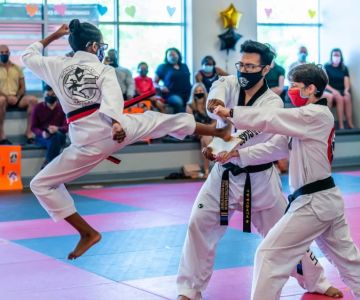
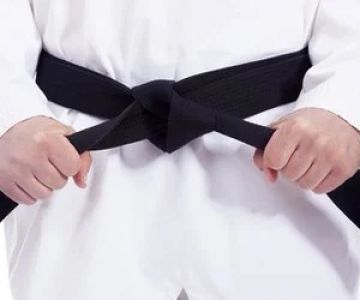


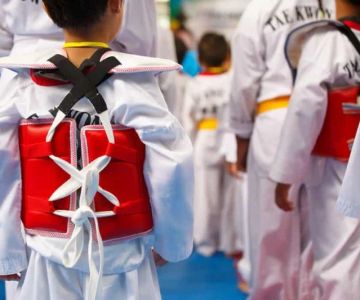
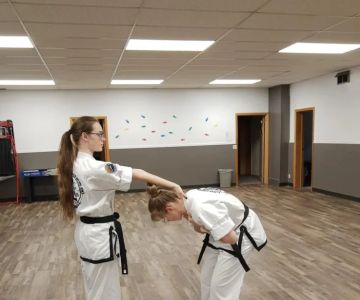
 Fort Walton ATA Martial Arts4.0 (11 reviews)
Fort Walton ATA Martial Arts4.0 (11 reviews)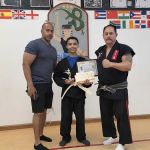 Universal Warrior Mixed Martial Arts4.0 (27 reviews)
Universal Warrior Mixed Martial Arts4.0 (27 reviews) Team Pure Fitness4.0 (27 reviews)
Team Pure Fitness4.0 (27 reviews)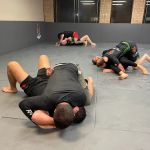 Heart & Dagger BJJ5.0 (112 reviews)
Heart & Dagger BJJ5.0 (112 reviews) Twin Tigers Martial Arts5.0 (38 reviews)
Twin Tigers Martial Arts5.0 (38 reviews) Champions Martial Arts Upper East Side5.0 (51 reviews)
Champions Martial Arts Upper East Side5.0 (51 reviews) How to Execute a Jumping Roundhouse Kick to the Head
How to Execute a Jumping Roundhouse Kick to the Head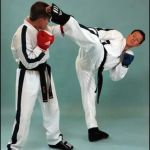 How to Execute a Double Kick Combination in Sparring
How to Execute a Double Kick Combination in Sparring How to Perform a Flawless Axe Kick: A Step-by-Step Guide
How to Perform a Flawless Axe Kick: A Step-by-Step Guide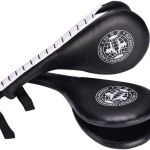 DIY Tae Kwon Do Training Equipment for Home Practice
DIY Tae Kwon Do Training Equipment for Home Practice How to Increase Your Vertical Jump for Tae Kwon Do Flying Kicks
How to Increase Your Vertical Jump for Tae Kwon Do Flying Kicks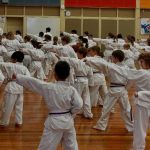 The History of the Tae Kwon Do Peace Corps
The History of the Tae Kwon Do Peace Corps